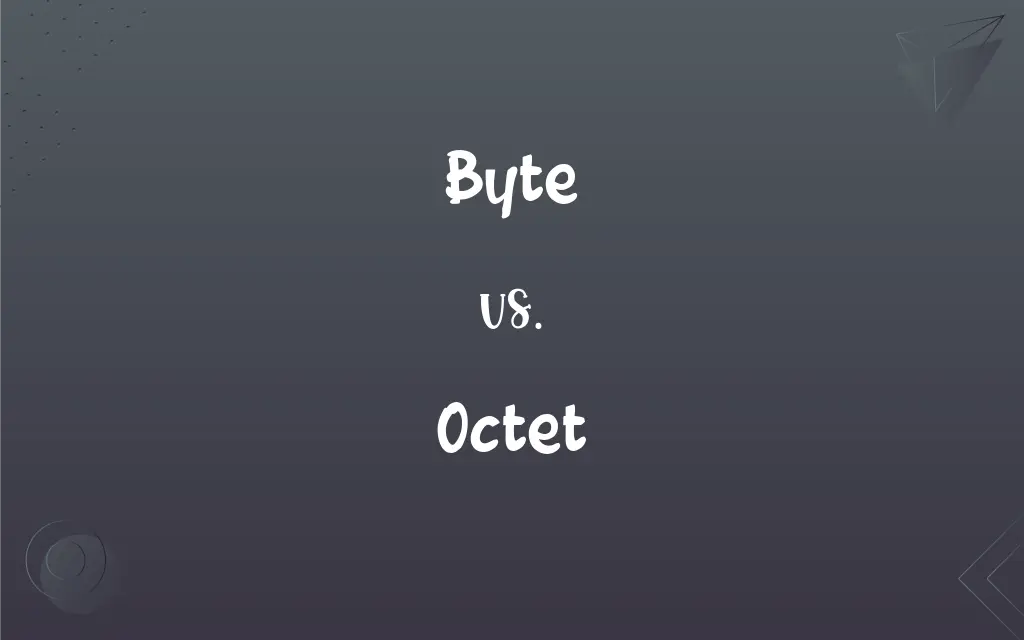Byte vs. Octet: What's the Difference?
By Harlon Moss || Updated on May 20, 2024
A byte is a unit of digital information typically consisting of 8 bits, used in most modern computing systems, whereas an octet is specifically defined as a group of 8 bits, ensuring clarity in contexts where byte size may vary.

Key Differences
A byte is a fundamental unit of digital information in computing and telecommunications, commonly consisting of 8 bits. It is the standard unit for encoding a single character of text in computers, and its size can sometimes vary based on historical or specific system architectures, though it is almost universally 8 bits today. An octet, on the other hand, is explicitly defined as 8 bits. This term is used to eliminate any ambiguity regarding the size of the data unit, ensuring precision, especially in networking and protocol specifications where consistency is crucial.
In most modern computing contexts, a byte and an octet can be considered equivalent because a byte is almost universally 8 bits. However, using the term "octet" guarantees clarity in technical discussions, especially in international standards and networking protocols where precise definitions are necessary.
The historical context of a byte's size varying (such as 6, 7, or 9 bits) is largely of academic interest today, as the 8-bit byte has become the de facto standard. The use of "octet" helps to avoid confusion in fields where data representation must be explicitly clear and consistent.
Both bytes and octets are essential in computing and digital communication, with the byte being more commonly used in general computing, while octet is preferred in technical documentation and networking to ensure unambiguous interpretation.
Comparison Chart
Definition
Unit of digital information
Group of 8 bits
ADVERTISEMENT
Size
Typically 8 bits, but historically varied
Always 8 bits
Usage
General computing, character encoding
Networking, protocols, technical standards
Ambiguity
Potentially ambiguous in historical contexts
Unambiguous
Standardization
Widely standardized as 8 bits today
Universally standardized
Byte and Octet Definitions
Byte
A unit of digital information consisting of 8 bits.
One byte can represent 256 different values.
ADVERTISEMENT
Octet
A consistent measurement in international standards.
Data packets are defined in terms of octets.
Byte
The basic addressable element in computer memory.
The memory size of the computer is 16 gigabytes.
Octet
A unit of digital information always comprising 8 bits.
The IP address is represented in four octets.
Byte
A standard unit for encoding text characters.
Each character in ASCII is represented by one byte.
Octet
A precise term used in networking standards.
An octet ensures clarity in data protocols.
Byte
A variable-length unit in historical computing contexts.
Early computers sometimes used 6-bit bytes.
Octet
A unit that avoids ambiguity in technical documentation.
The header consists of 20 octets.
Byte
A unit used for data storage and transfer.
The file size is 512 bytes.
Octet
A composition for eight voices or eight instruments.
Byte
A unit of data equal to eight bits. Computer memory is often expressed in megabytes or gigabytes.
Octet
A group of eight singers or eight instrumentalists.
Byte
A set of bits constituting the smallest unit of addressable memory in a given computer, typically eight bits.
Octet
A group of eight
"A train of heavy wagons rumbled north on the Winnipeg Trail, drawn by octets of oxen" (Garrison Keillor).
Byte
(computing) A short sequence of bits (binary digits) that can be operated on as a unit by a computer; the smallest usable machine word.
Octet
See octave.
Byte
A unit of computing storage equal to eight bits, which can represent any of 256 distinct values.
The word “hello” fits into five bytes of ASCII code.
Octet
A set of eight valence electrons in an atom or ion, forming a stable configuration.
Byte
A sequence of 8 bits (enough to represent one character of alphanumeric data) processed as a single unit of information
Octet
A group or set of eight of something.
Octet
(music) A group of eight musicians performing together.
An octet of waiters sang her "Happy Birthday".
Octet
(music) A composition for such a group of musicians.
Octet
(computing) A byte of eight bits. Abbreviation: o
Octet
A group of three bits, representing any of eight possible values.
Octet
A composition for eight parts, usually for eight solo instruments or voices.
Octet
A group of eight singers or eight musicians.
Octet
The cardinal number that is the sum of seven and one
Octet
Eight performers or singers who perform together
Octet
A set of eight similar things considered as a unit
Octet
Eight people considered as a unit
Octet
A musical composition written for eight performers
Octet
A fundamental unit in binary data transmission.
The payload is 128 octets long.
FAQs
What is an octet?
An octet is a unit of digital information that is always exactly 8 bits.
What is a byte?
A byte is a unit of digital information typically consisting of 8 bits.
Is a byte always 8 bits?
While a byte is almost universally 8 bits today, historically it could vary in size.
Where is the term octet commonly used?
The term octet is commonly used in networking and protocol specifications.
Why use the term octet?
The term octet is used to avoid ambiguity and ensure clarity, particularly in technical and networking contexts.
Can a byte be more than 8 bits?
Historically, yes, but in modern computing, a byte is standardized to 8 bits.
How many values can a byte represent?
A byte can represent 256 different values (0 to 255).
Are bytes and octets the same?
In most modern contexts, yes, since a byte is now almost universally 8 bits, making it equivalent to an octet.
Why is the byte important in computing?
The byte is essential for encoding characters, data storage, and memory addressing in computers.
How many values can an octet represent?
An octet, being 8 bits, also represents 256 different values (0 to 255).
What is the historical significance of varying byte sizes?
Early computing systems had different architectures, leading to bytes of different sizes, such as 6, 7, or 9 bits.
What is a kilooctet?
A kilooctet is 1,024 octets, equivalent to a kilobyte.
What is a common use of octets in data transmission?
Octets are used to define packet sizes and data segments in protocols like TCP/IP.
Why is the octet important in networking?
The octet provides a clear and unambiguous unit of measurement for data, ensuring consistent interpretation across systems.
What does a byte typically encode?
A byte typically encodes a single character in text, such as a letter or a symbol.
Is the use of octet limited to networking?
While common in networking, octets can be used in any context where precise data measurement is needed.
How are octets used in IP addresses?
IP addresses are often divided into four octets, making them clear and standardized.
What is a kilobyte?
A kilobyte is 1,024 bytes.
How does byte size impact software development?
Consistent byte size simplifies data processing and memory management in software development.
What is the role of bytes in computer memory?
Bytes are the basic addressable units in computer memory, determining how data is stored and accessed.
About Author
Written by
Harlon MossHarlon is a seasoned quality moderator and accomplished content writer for Difference Wiki. An alumnus of the prestigious University of California, he earned his degree in Computer Science. Leveraging his academic background, Harlon brings a meticulous and informed perspective to his work, ensuring content accuracy and excellence.































































